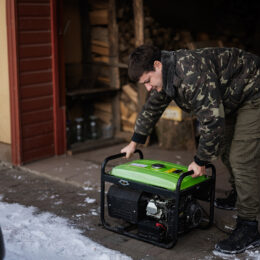
Disclaimer: The Energy column provides general information to help you manage your energy costs. Some electric cooperatives may not offer all the programs mentioned in this column.
By Bob Geswein, guest columnist
With spring comes a natural desire to remodel our homes or perhaps even build a new abode. Often during this time of year, the energy experts at electric cooperatives receive desperate phone calls from members asking “Could you recommend a contractor?”
Unfortunately, I’m not aware of any electric cooperative that conducts certifications, evaluations or testing that would result in that objective response.
So any advice you would get from a co-op employee is going to be subjective.
At my electric cooperative, for many years the standard response about contractors has been: “We do not conduct evaluations for maintaining a list of preferred contractors.”
Unfortunately, this answer does not help members search for a reliable, top-notch contractor.
So, I’ve developed the following method for selecting the best person for the job.
Seek out people you know who have hired a contractor in the past. Ask them the following questions. If you’re satisfied with their answers, they can refer you to a contractor who can get the job done for you.
• When you chose a contractor to perform your work and set the date, did the contractor show up on the agreed upon date? If you have to take off from work or rearrange your day to be there, the “no show” contractor is not only inconsiderate of your time, but he/she can cost you additional money. Good contractors keep their appointments.
• When your contractor’s employees showed up at your home, were they professional in appearance, demeanor, appropriate uniform, etc.? Were you relieved when they left? Good contractors address these issues effectively with their employees before they allow them to work in your home for you.
• When your contractor finished his/her work, did everything work correctly or look good upon leaving? Or were one or more callbacks necessary to finally have the equipment operating (or fixed) properly? These answers implicate contractors’ skill levels. Good contractors continually invest in training to be effective and pull additional resources as necessary.
• When they finished the work, did they inadvertently damage another feature in your home? Did they clean up any debris from the work effort and remove it from your home? Answers to these concerns indicate work habits and a respect for your home. Good contractors leave no indication of having been in your home when they are finished other than the results of their good work.
• When you received a proposal from your contractor, was a copy of his certificate of insurance willingly provided? Homeowners would be wise to predetermine the working arrangement they are going to have in getting their desired work done. Many homeowners may possibly and inadvertently enter into an employer (homeowner) / employee (worker) relationship when they have someone work for them on the “side.” This relationship has legal implications regarding liability and workmen’s compensation insurance that can be complicated and result in unpleasant long term outcomes. Contractors who provide you with a certificate of insurance are putting you at ease in demonstrating they have the business insurance in force to protect you from risks in these areas. Uninsured contractors, while putting homeowners at risk for issues they may want no part of, will many times have lower proposal amounts for performing the work. Business insurance is not cheap, and homeowners would be prudent to determine if the contractor they want working in their home has it.
• Finally, was your project completed on time and according to budget? If not, why so? Be sure to always ask the tough questions to ensure you are getting the best quality customer service.
If you receive what you consider appropriate answers to these questions, you should have the name of the “preferred” contractor you originally called your electric cooperative for and the one you want to do business with.
Bob Geswein is a retired employee of Harrison County REMC in Corydon, Indiana.



